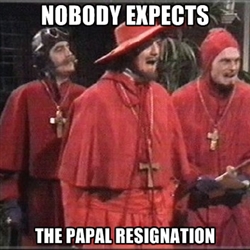 It’s been an odd few weeks in the realm of ancient traditions, what with the discovery of Richard III and now the first papal resignation in six hundred years (and the first voluntary one since the thirteenth century, when Celestine V stepped down in 1294). As of 8pm (2pm EST) on Thursday, the Pope will no longer be the Pope, and the College of Cardinals will have to go about the business of electing his successor, which is a tradition with a long, long history and plenty of pomp, circumstance, and maybe just a bit of superstition.
It’s been an odd few weeks in the realm of ancient traditions, what with the discovery of Richard III and now the first papal resignation in six hundred years (and the first voluntary one since the thirteenth century, when Celestine V stepped down in 1294). As of 8pm (2pm EST) on Thursday, the Pope will no longer be the Pope, and the College of Cardinals will have to go about the business of electing his successor, which is a tradition with a long, long history and plenty of pomp, circumstance, and maybe just a bit of superstition.
The election of a Pope is a significant event, if for no other reason than the incoming pontiff will have to contend with the fallout for the seemingly endless abuse scandals and will likely need to grapple with the ever-increasing need for modernization and reform. Despite the fact that the Church’s influence is largely on the wane in the west, there are still over a billion Catholics worldwide (and rising), so it is enormously important for the world at large.
Not surprisingly, for an institution with a nearly two thousand year history, there is a highly-developed system of Catholic Canon Law. While, like most religious legal codes, it does not have the full force of law in most jurisdictions, it is every bit as nuanced and extensive as many legal systems. Saint-Paul University in Ottawa even has a full-blown Faculty of Canon Law (the only one in Canada, although there are five in the Vatican).
Depending on how good your Latin is, the 1983 Code of Canon Law is available on the Vatican’s website in its intended language (as well as many others, including English). There is also pretty impressive archive of documents, including the Bible, Catechism of the Catholic Church, Vatican II documents, and Official Acts of the Holy See. The current rules surrounding the papal conclave and the election of the Pope are not in the Code of Canon Law, but rather in the Apostolic Constitution Universi Domenici Gregis implemented by John Paul II in 1996 (which can be found here).
While Canon Law is not one of the collection’s primary focuses here at the Osgoode Law Library, we do have a few interesting works that deal with the subject. The majority of the texts are in the KBU2000+ and X561 ballparks on the shelves (with the latter being a shelf below the lamentably underutilized Visigothic Code), and include the commentaries The Canon Law: Letter and Spirit and the imagininatively-titled Canon Law. We also have a number of special collection texts in Latin and French, including the 1681 Corpus Juris Civilis and the succinctly-titled Consiliorvm, sive Responsorvm, d. Iacobi Menochii … liber primus-duodecimus : Cui in hac postrema omnium editione indicem, generalem etiam addidimus, qui complectitur ea omnia que notatu digna, in ipsis duodecim Consiliorum libris leguntur, alphabetico ordine in studiosorum commodum, & gratiam in vnum collectus from 1609 (and no, I’m not sure what it means either).
So if, over the coming weeks, you find yourself wondering what the statutory basis for the conclave is, as always we at the Osgoode Law Library can help you out!
P.S. If you’ve ever wondered what the Vatican Library is like (answer: amazing), this article from the New Yorker entitled “God’s Librarians” should set you straight. The Library’s website is also worth a gander as well.

